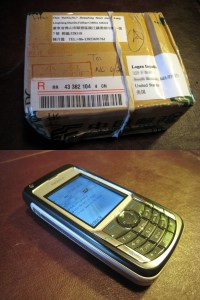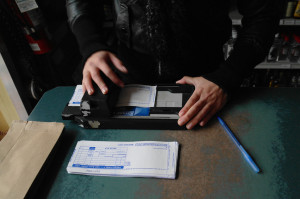October 11th, 2013 by Elma Jane
(Moto) Mail Order/Telephone Order Merchant – In the realm of credit card processing is defined as a merchant who manually keys in over 50% of their transactions and an Internet Merchant is one who accepts transactions over the Internet via an E-Commerce store with an online gateway or who submits transactions manually through a Virtual Terminal.
Qualified Transaction Conditions (For MOTO/Internet merchants the Mid-Qualified Rate is essentially the Qualified rate as these merchants never swipe a credit card through a terminal.)
One electronic authorization request is made per transaction and the transaction date is equal to the shipping date. The authorization response data must also be included in the settled transaction.
Additional data (sales tax and customer code) is required in the settled transaction on all commercial (business) cards at non-Travel & Entertainment (T&E) locations.
The authorization request message must include Address Verification Service (AVS), which verifies the street address and the zip code of the card holder. NOTE: The only way this happens is if your software is set up to do this, or, if you are using a terminal, then if you capture the AVS information at the time of keying in your transaction.
The settled transaction amount must equal the authorized amount.
The settled transaction must include the business’s customer service telephone number, order number, and total authorized amount.
The transaction is electronically deposited (batch transmitted) on or 1 day after authorization date.
The transaction/shipping date must be within 7 calendar days of authorization date.
Non-Qualified Transaction Conditions
One or more of the Qualified or Partially Qualified conditions were not met.
Commercial Card without the additional data.
The transaction was not electronically authorized or the authorization response data was not included in the settled transaction.
The transaction was electronically deposited (batch transmitted) greater than 1 day from transaction/shipping/authorization date, or:
The VISA Infinite card was accepted.
Commercial Card Additional Data
MasterCard
Corporate Data Rate II (Purchasing cards): Sales Tax and customer Code (supplied by cardholder at point of sale) Corporate Data Rate II (Business and Corporate cards): Sales Tax International Corporate Purchasing Data Rate II: Sales Tax and Customer Code (supplied by cardholder at point of sale)
The following information must also be provided: Merchant’s Federal Tax ID; Merchant Incorporation Status; and Owner’s full name if the merchant is a sole proprietor.
Visa
Purchasing cards: Sales Tax and Customer Code (supplied by cardholder at point of sale) Corporate and Business cards: Sales Tax
Posted in Credit card Processing, e-commerce & m-commerce, Electronic Payments, Internet Payment Gateway, Mail Order Telephone Order Tagged with: address verification service, authorization, avs, batch, business, corporate, credit card processing, data, e-commerce, electronically, entertainment, fax order, gateway, internet, internet merchant, keying, mail order, moto, phone order, qualified, settle, store, telephone order, transactions, transmit, travel, virtual terminal
October 10th, 2013 by Elma Jane
There are various payment processing rates that apply to credit and debit card transactions. Visa and MasterCard do not publish their rules and regulations or the payment processing standards required to get the lowest interchange rate. It’s up to credit card processing companies to understand and implement them to their merchants’ benefit. A high downgrade rate may indicate that your processor does not know the standards, or may be reluctant to implement best practices or new rules changes. The application of these rates is based on a variety of factors related to the particular circumstances of the sale and the way the payment is processed, as well as on the type of the card that was used. Typically payments processed in a card-not-present environment (e.g. online or over the phone) are assessed higher processing fees than payments processed in a face-to-face setting. Payments made with regular consumer types of cards are generally processed at lower rates than payments made with rewards, business-to-business or commercial cards. Debit cards are processed at lower interchange rates than credit cards. In order to simplify the pricing for their merchants, the majority of the processing companies have elected to use various tiered pricing models (two-tiered, three-tiered, six-tiered, etc.). There are three general classifications used in the various tiered pricing models:
Qualified Transaction (also referred to as the Swiped Rate) This is the rate charged per each transaction when the card is physically swiped through a credit card terminal. When a transaction is processed in accordance with the rules and standards established in the Payment Processing Agreement, signed by the merchant and the processing bank, and It involves a regular consumer credit card, It is processed at the most favorable rate. This rate is called a “Qualified Rate” and is set in the merchant’s Payment Processing Agreement. The Qualified Rate is set based on the way a merchant will be accepting a majority of their credit cards. For example, for an internet-based merchant, the internet interchange categories will be defined as Qualified, while for a physical retailer only transactions where cards are swiped through a terminal will be Qualified.
Mid-Qualified Transaction This is the rate charged when a transaction is manually keyed-in using AVS – Address Verification Service (card #, expiration date, address, zip code and CVV code all match). When a consumer credit card is keyed into a credit card terminal instead of being swiped or The cardholder uses a rewards card, business-to-business or another special type of card the transaction is charged a discount rate that is less favorable than the Qualified. This rate is called a “Mid-Qualified Rate.”
Non-Qualified Transaction This is the rate charged when manually keying-in a transaction without using AVS – Address Verification Service. When a special kind of credit card is used (like a rewards card or a business card), or a payment is not processed in accordance with the rules established in the Payment Processing Agreement, or It does not comply with some applicable security requirements.
Qualified Transaction Conditions
One electronic authorization request is made per transaction and the transaction/purchase date is equal to the authorization date. The authorization response data must also be included in the transaction settlement. The authorization transaction amount must match the settled (deposit) transaction amount. The card that is used is not a commercial (business) credit card The credit/debit card is present at the time of the transaction, the card’s full magnetic stripe is read by the terminal, and a signature is obtained from the cardholder at the time of the transaction.
The transaction must be authorized and settled under a standard retail industry code.
The transaction must be electronically deposited (batch transmitted) no later than 1 day from transaction/purchase/authorization date.
Mid-Qualified Transaction Conditions
One or more of the Qualified conditions were not met
Non-Qualified Transaction Conditions
One or more of the Qualified conditions were not met, or The card that was used was a commercial card without submitting the additional data or:
The transaction was electronically deposited (batch transmitted) greater than 1 day from the authorization date, or:
The transaction was not electronically authorized, or the authorization response data was not included in the transaction settlement.
Posted in Best Practices for Merchants, Credit card Processing, Electronic Payments, Financial Services, Merchant Services Account Tagged with: account, authorization, authorized, best, business, card, card-not-present, credit, cvv, debit, downgrade, interchange, keying, lowest, MasterCard, merchant, payment, processed, Processing, qualified, rate, rewards, standards, swiped, transaction, visa

